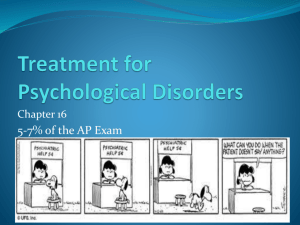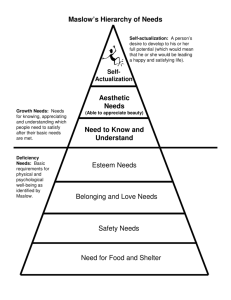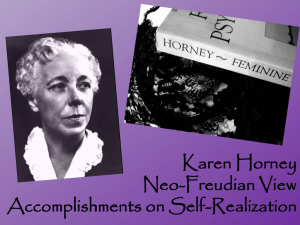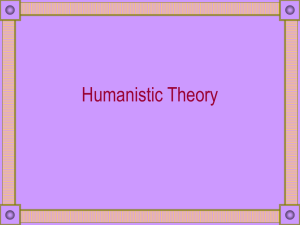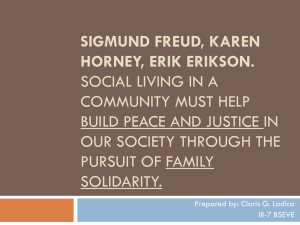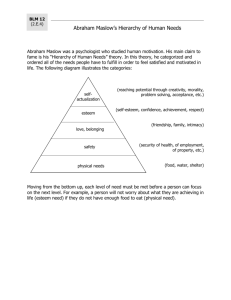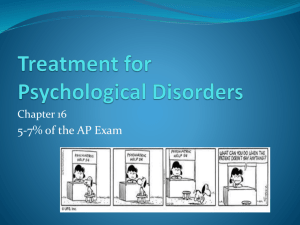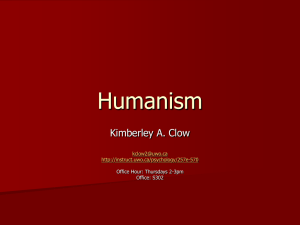The Satisfying Life from the Perspective of Western Psychological
advertisement
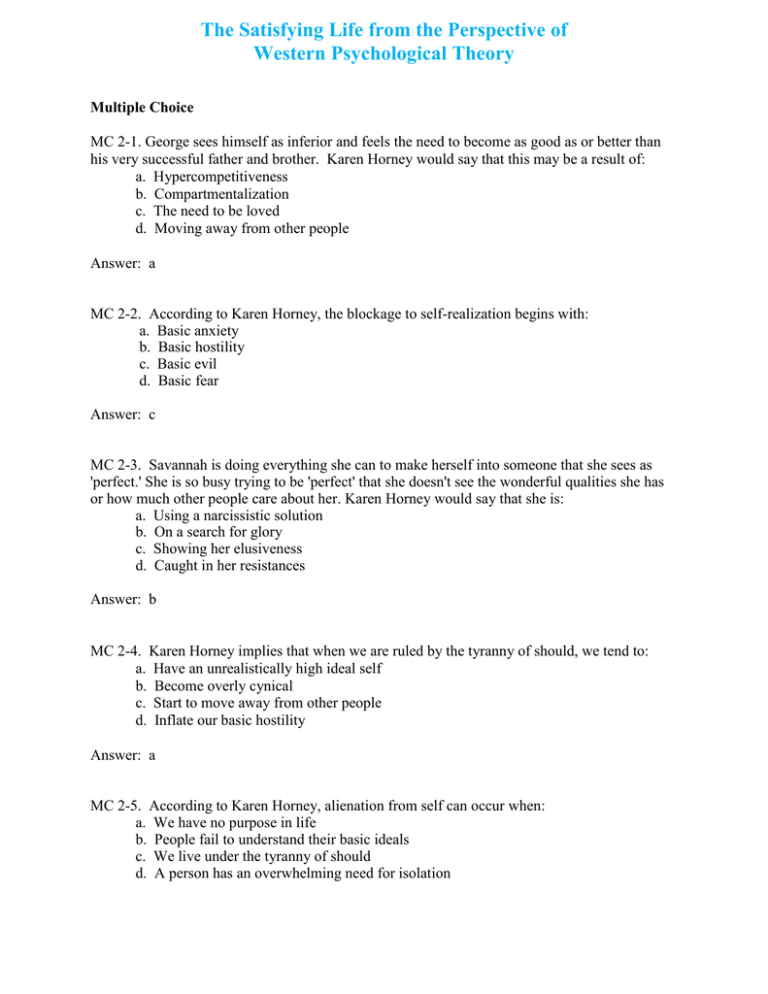
The Satisfying Life from the Perspective of Western Psychological Theory Multiple Choice MC 2-1. George sees himself as inferior and feels the need to become as good as or better than his very successful father and brother. Karen Horney would say that this may be a result of: a. Hypercompetitiveness b. Compartmentalization c. The need to be loved d. Moving away from other people Answer: a MC 2-2. According to Karen Horney, the blockage to self-realization begins with: a. Basic anxiety b. Basic hostility c. Basic evil d. Basic fear Answer: c MC 2-3. Savannah is doing everything she can to make herself into someone that she sees as 'perfect.' She is so busy trying to be 'perfect' that she doesn't see the wonderful qualities she has or how much other people care about her. Karen Horney would say that she is: a. Using a narcissistic solution b. On a search for glory c. Showing her elusiveness d. Caught in her resistances Answer: b MC 2-4. Karen Horney implies that when we are ruled by the tyranny of should, we tend to: a. Have an unrealistically high ideal self b. Become overly cynical c. Start to move away from other people d. Inflate our basic hostility Answer: a MC 2-5. According to Karen Horney, alienation from self can occur when: a. We have no purpose in life b. People fail to understand their basic ideals c. We live under the tyranny of should d. A person has an overwhelming need for isolation Answer: c MC 2-6. Jan always lets her boyfriend win at tennis. Karen Horney would say that Jan is a: a. Detached person b. Compliant person c. Compulsive person d. Sensitive person Answer: b MC 2-7. One of Fritz Perls' major assumptions about the human being is that: a. The human being can be chronically damaged by the demands of family b. The human being is fundamentally healthy and well-adjusted c. The human being naturally experiences anxiety as a condition of living d. The human being is ignorant of the reality of his/her unconscious Answer: b MC 2-8. Fritz Perls believed that: a. Experience is more important than "book-learning" b. We need to remember the past accurately in order to cope with today c. Our basic nature is a blank slate, neither good nor bad d. People try to take too much responsibility for themselves Answer: a MC 2-9. Ms. Hallett, the burnt-out Grade 4 teacher, tells her class to take more initiative in their work and teach themselves. Fritz Perls would say that Ms. Hallett: a. Is eliminating the children's gestalts b. Is overindulging the children c. Is giving the children catastrophic expectations d. Has put the children in an impasse Answer: d MC 2-10. When people feel that they will not be loved unless they conform to the wishes of others, Fritz Perls says they have: a. Unrealistic worries b. Basic fears c. Catastrophic expectations d. Maya Answer: c MC 2-11. Jamal daydreams about how he will act when he owns his own business one day. Fritz Perls would say that Jamal is spending his time in: a. Implosiveness b. An introjected field c. A subjective reality d. Maya Answer: d MC 2-12. a. b. c. d. Fritz Perls said that a person with “response-ability” is one who can: Take responsibility for his/her own needs Take responsibility for the needs of others Demonstrate the greatest amount of flexibility in his/her behaviour Overcome the negative tendencies within his/her unconscious Answer: a MC 2-13. Christine hates the fact that her son is a thief, but she loves him anyway. Christine is giving her son what Carl Rogers calls: a. Self-actualization b. Unconditional positive regard c. Empathy d. Openness Answer: b MC 2-14. When Carl Rogers says we need openness, he means we need: a. The chance to be true to ourselves b. Complete honesty from other people c. To see the world through the perspectives of others d. Esteem and respect from other people and from ourselves Answer: a MC 2-15. a. b. c. d. Carl Rogers calls the unique way each individual sees the world: The impasse Maya The phenomenal field The plateau Answer: c MC 2-16. a. b. c. Abraham Maslow says that the need for self-actualization: Is a deficiency need Can never be totally satisfied Is more important than all the other needs d. Can be realized through peak experiences Answer: b MC 2-17. a. b. c. d. Abraham Maslow contends that, unlike peak experiences, plateau experiences: Are necessary for self-actualization Result in more self-actualization Can occur only when esteem needs are satisfied Are more enduring but less intense Answer: d MC 2-18 Althea would like to go to university but she fears her husband will stop loving her if she does. Abraham Maslow would say that Althea has: a. An overdeveloped empathy b. The Jonah complex c. Basic anxiety d. Alienation from her husband Answer: b MC 2-19. Abraham Maslow feared that scientific enquiry has removed our sense of wonder in the face of the unknown; that is, science has become: a. Desacralized b. Deactualized c. Impassed d. Alienated Answer: a MC 2-20. a. b. c. d. Rollo May said a person who lives by other people's values is: Not self-aware Not authentic Conformist Powerless Answer: b MC 2-21. a. b. c. d. To Rollo May, a major characteristic of the human being is: The ability to interact with others The courage to preserve the internal sense of self The tendency to understand our own psyches The freedom to choose what we do, say, think or feel Answer: d MC 2-22. Sarah was horrified to find that her father, whom she adored, was stealing money from relatives who trusted him. Rollo May would say that this revelation would probably leave Sarah feeling anxious because the discovery: a. Provided a threat to her value of admiring her father b. Undermined her sense of authenticity in the face of her father's betrayal c. Made her wonder if people thought that she was a thief as well d. Forced her to remove her father from her life Answer: a MC 2-23. a. b. c. d. Rollo May felt that unlike other animals, human beings: Have awareness of the world Have self-consciousness Have courage Have a need for self-preservation Answer: b MC 2-24. a. b. c. d. According to Rollo May, the need for power: Is a normal desire to be able to affect the environment Is a neurotic desire to impose one's will on other people Is a manifestation of moral anxiety Is an abnormal way to cope with feelings of inferiority Answer: a MC 2-25. Prof. James sees marking essays as a horrible chore. Beatrice, the teaching assistant, sees marking essays as a way to make extra money. Instructor White sees marking essays as a way to learn more about her students. Rollo May would say that each person is showing his/her: a. Will b. Wish c. Ontology d. Intentionality Answer: d True/False TF 2-1. Karen Horney believed that when parents do not provide love and security for the child, the child feels basic hostility. Answer: True TF 2-2. According to Karen Horney, the idealized self is constantly changing in poorly adjusted people. Answer: False TF 2-3. Since Nigel has an extreme need for independence, Karen Horney would say that he is moving against people. Answer: False TF 2-4. Fritz Perls believes that people often confuse what they need with what they want. Answer: True TF 2-5. Anxiety, said Fritz Perls, is the tension between now and then. Answer: True TF 2-6. Carl Rogers believed that people may become anxious when they do not have a phenomenal field. Answer: False TF 2-7. Abraham Maslow called the need for self-actualization a deficiency need. Answer: False TF 2-8. According to Rollo May, an authentic person defines their own values and beliefs. Answer: True TF 2-9. Guilt, says Rollo May, is an inescapable part of the human condition. Answer: True TF 2-10. When Mary spends her time longing for a better job, but doesn't search for one, Rollo May says that she is showing will, but not wish. Answer: False Short Answer SA 2-1. How does basic anxiety develop in a child, according to Karen Horney? SA 2-2. According to Fritz Perls, what is a well-adjusted person like? SA 2-3. Why does Carl Rogers say that people need empathy to actualize? SA 2-4. What characteristics do self-actualized people have, according to Abraham Maslow? SA 2-5. According to Rollo May, what is intentionality? Essay E 2-1. Describe the three kinds of parenting problems/mistakes that Fritz Perls believes may occur in a child’s upbringing, indicating why these may have ill effects on the child and giving an example of each. E 2-2. What are Rollo May's principles of being? Which principles are central to the human being and why?
